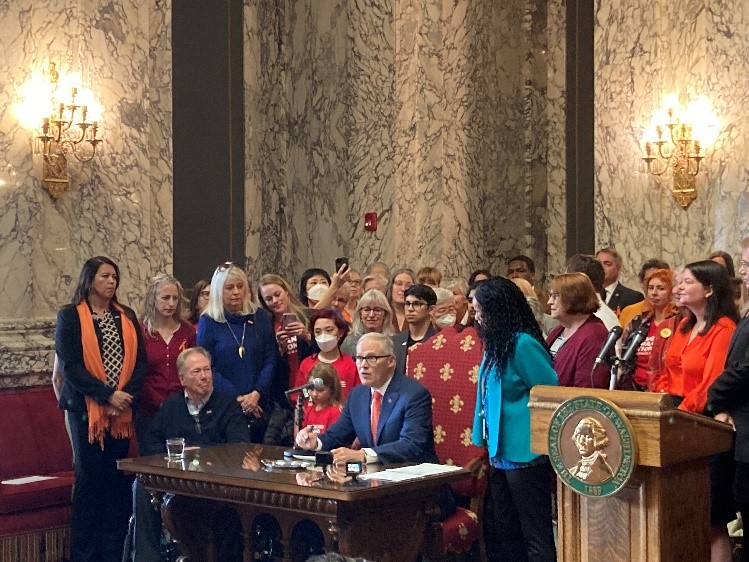Gov. Inslee Signs Major Pieces of Legislation On Gun Reform and Reproductive Healthcare
May 15, 2023
The Women’s Commission was thrilled to be present for Governor Inslee’s bill signing for several bills that are essential for ensuring access to reproductive and gender-affirming care, as well as safety from gun violence, for Washington residents and people traveling to our state.
Gun Reform
On April 25, 2023 at the state capitol, Governor Inslee adopted historic gun safety laws by signing three major pieces of legislation the Women’s Commission has been following throughout 2023 legislative session.
With his signature the state of Washington now:
- Bans the sale, distribution, and importation of assault weapons in Washington. The legislation was bought by request of the Attorney General Bob Ferguson. The law defines assault weapons using a list of specific firearms, and specific features that make them uniquely effective at causing a mass amount of harm and devastation in a short amount of time when compared to other firearms.
- Requires a 10-day waiting period to enable in-depth background checks by local law enforcement, and to allow for a “cooling off period”. This legislation, requested by the Governor’s office, also puts in place requirements for gun buyers to complete training that includes:
- Proper storage, handling, use and transportation practices,
- In-depth training on Washington’s self-defense laws,
- De-escalation strategies, and
- Risk awareness for children and people in mental health crisis.
- Increases firearm industry accountability and access to civic remedies for victims of gun violence and their families. This law establishes legal liabilities for gun dealers and manufacturers. These liabilities are outlined as, “marketing products that promote conversion of products into illegal products, market products to children, sell weapons to people prohibited from possessing and purchasing firearms, allow straw purchases, distribute or sell firearms to dealers known to be acting in a dangerous or irresponsible manner.” Violations are enforceable by the Attorney General’s office and Washington residents can seek civic remedy under the Consumer Protection Act.

Reproductive Rights
On April 27 at the University of Washington, Governor Inslee signed into law bills that serve to protect vital reproductive rights and gender affirming care. While speaking ahead of the bill signing Governor Inslee affirmed,
“The right of choice is an issue of freedom. Health care must remain the providence of individual Washingtonians. These laws will keep the tentacles of oppressive and overreaching states out of Washington.”
With the signing of 5 bills, the Governor solidified protections to reproductive healthcare in Washington in the following ways:
- Protecting abortion medication access through the securing of a 3-year supply of mifepristone which will be held and distributed to health providers through the Department of Corrections. Sen. Keiser, the bill sponsor, said during the Thursday bill action ceremony,
“The people of Washington have demonstrated time and again — in polls and at the ballot box — that we support the right to reproductive freedom, but that right means nothing without actual access to care. For 10,000 women every year in our state, that right comes down to having access to mifepristone. We cannot allow an unelected judge in Texas to ignore more than two decades of evidence and deny Washingtonians a safe, effective medication for their reproductive choice.”
- Shields Washingtonians from legal overreach from states that restrict abortion rights by prohibiting compliance with out-of-state subpoenas related to abortion and gender affirming care services; preventing cooperation with out-of-state investigations; banning extraditions related to abortion and gender affirming care services that occur legally in Washington; and protecting providers from harassment for providing these services.
- Protects health providers in Washington from disciplinary action or risk of losing their medical license for providing reproductive health services and gender affirming care in our state regardless of the patient’s state of residence. Rep. Riccelli sponsored that bill and reiterated,
“When our health care providers are following the law and protecting their patients, they should be protected too. I’m proud the House voted to put the patients of Washington state first by protecting the doctors, nurses, and staff who provide essential care. This will help ensure Washington remains a place where access to essential health care is vigorously protected.”
- Enhanced protections for consumer health privacy data surrounding the collecting, sharing, and selling of consumer health data. Rep. Slatter illustrated the importance of this law stating,
“My Health, My Data protects the independence and dignity of individuals when they make healthcare decisions. It prevents vulnerabilities in the technological era that are being used to target and exploit consumers who may not be aware of the vast data that everything from our watches and phones collect.”
- Eliminates cost -sharing for abortion care while also protecting patients from unexpected costs from their care which they may be unable to cover. The bill sponsor, Sen. Cleveland, made clear this is an equity issue in her statement,
“This is a historic step in making reproductive care not only more accessible, but equitable and fair. Nobody should be unable to receive the care they need simply because of their inability to pay.”




